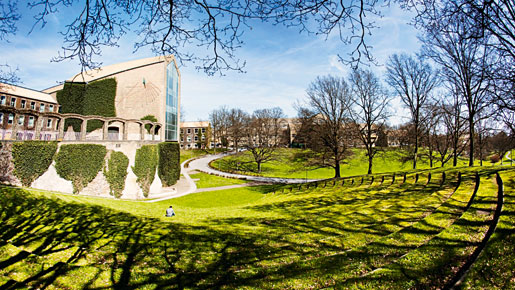
The School of Business and Social Sciences is the result of a merger between Aarhus School of Business and the Faculty of Social Sciences. This merger was part of a recent major reorganisation of Aarhus University. Core drivers for the reorganisation and the merger of Business and Social Sciences are the grand challenges of society. These challenges call for interdisciplinary solutions and thus for interdisciplinary research and programmes.
Explicitly linked
The research areas covered by the broad business school make it relatively easy to engage in interdisciplinary research of major interest to both business and society as a whole. No business leader can be without knowledge of the political situation and the political power game in the relevant areas of interest for his/her company, and civil servants and politicians need a thorough understanding of how the business sector operates. An intimate knowledge of the law and of the functioning of economies both at the macro and the micro level is a must for agents both in the private and the public sector.
Recently, the opportunities to conduct experimental research in the social sciences have improved both as a consequence of the recent advances in brain research and advances within areas of social sciences, including business research. Furthermore, the availability of data from public registers in Denmark containing detailed information on the activities of individuals and firms makes it feasible for future research to obtain a much more realistic understanding of why and how the society and its agents behave and react to different policies, decisions, new products and so on. It is obvious that many of the very important advances in the social sciences including business require an interdisciplinary approach, that is, a cooperation between the different disciplines within the area, and that psychology will be in the centre of such an endeavour.
Paving a new road
Neither can a business leader be without knowledge of the impact his/her company has on society, on people and on the environment. The globalised economy is deeply inter-connected; the challenges of society and business are complex and require a new way of cooperation between government, business and civil society. Future leaders need new skills to be able to navigate this complex agenda. Society needs new knowledge in order to find solutions to the great challenges.
Therefore, the school has set strategic focus on “sustainable growth through innovation” and since 2009 has been one of the most active participants in the UN programme “Principles for Responsible Management Education (PRME)”. The merger between business and social sciences will strengthen this holistic and strategic focus on sustainable growth through innovation, bridging business and the public sector, economics and politics, governance and human behaviour.
The school hosts several large internationally well-known, externally funded research centres, such as the Center for Research in Econometric Analysis of Time Series, which has just been granted a five-year extension and is recognised as a world leader within time series econometrics. There is also the Centre on Autobiographical Memory Research; Centre for Research on Customer Relations in the Food Sector; Centre for Research in Integration, Education, Qualifications, and Marginalization (CIM); and the Centre for Corporate Performance (CCP) and several others.
In addition, all departments are internationally recognised within their fields of expertise, like for instance, the Department of Economics and Business, which is well known for its research in labour economics. The Nobel Laureate in Economics, Dale T. Mortensen, has been employed by the department as a part-time Niels Bohr professor – for the last five years financed by The Danish National Research Foundation – an affiliation that will continue for the next five years.
Research for real problems
The objective of the departments is to conduct research and offer academic programmes at the highest level. Business and Social Sciences offers the highest level of academic learning and all programmes are research-based. Besides a full-degree programme, a full portfolio of programmes are offered to the corporate world and public sector. Currently, the departments have a considerable number of international faculty and students, but they strive to further increase the international recruitment of excellent researchers to promote the overall academic objectives.
The merits of applied versus pure research are often discussed in academic and business circles. For the school this is very simple; it sees pure research within business and social sciences as applied research only with a wider time frame and greater level of uncertainty. Apart from the development of new research methodologies, almost all its research is based on real life problems and issues relevant to business and society. The cornerstone of talent development at Business and Social Sciences is the PhD programme organised under the auspices of a unified graduate school – Aarhus Graduate School of Business and Social Sciences.

